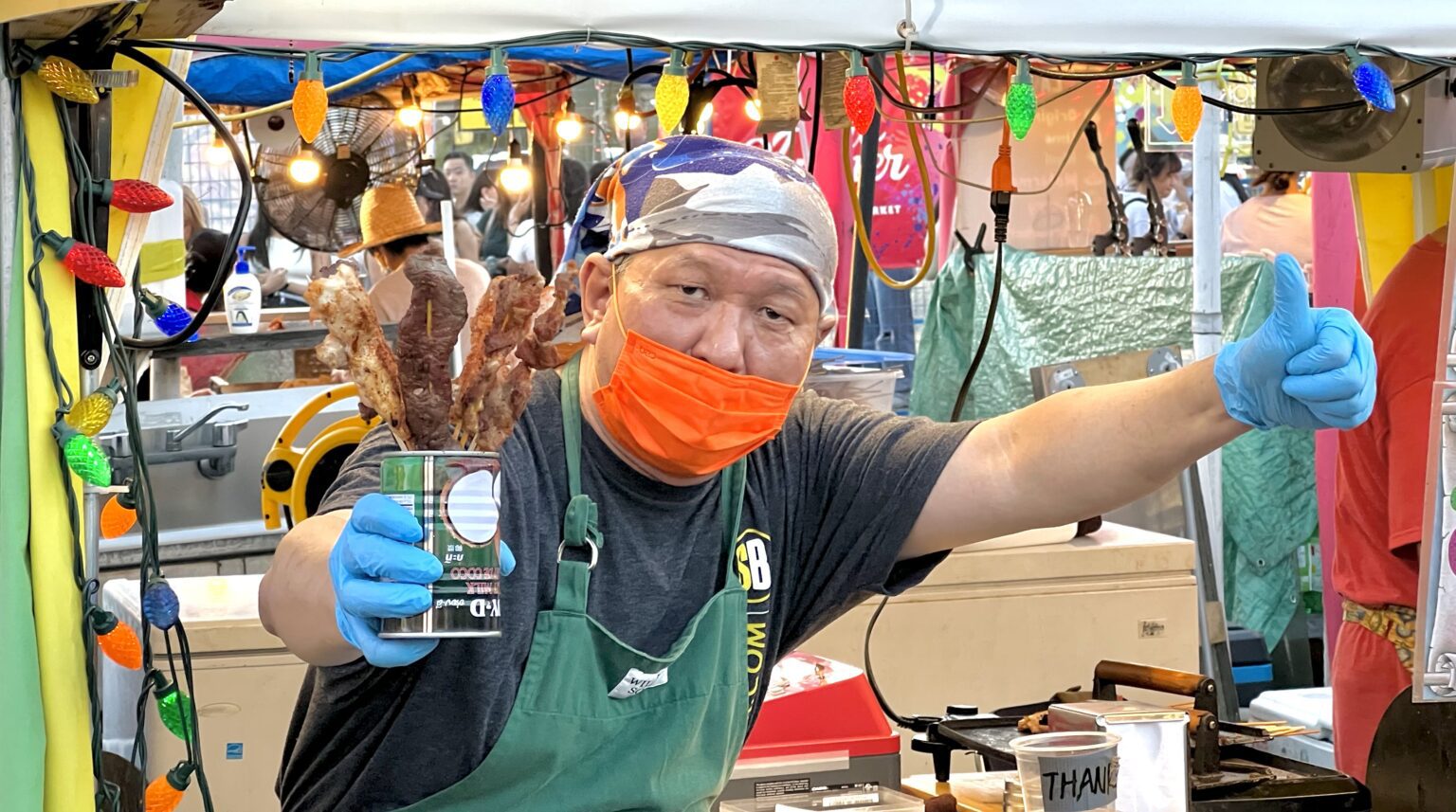RICHMOND, British Columbia — We should have gone with the marinated pig’s knuckles. With noodles.
Instead, we ordered the spicy pig’s ears on a quiet Sunday at the Richmond Public Market. A pile of gelatinous membranes arrived in a plastic cup courtesy of Tony’s Chinese Restaurant.
My friend Ellie immediately scrunched her face. I kept an even temperament while examining the worm-like slices that appeared to be slathered in a tasty Chinese chili sauce. It seemed promising.
I plucked one from the bowl with my wooden chopsticks. Hum. Tasted like gristle off a steak bone. Ellie cautiously put a tasteless piece into her mouth and winced.
“It’s not my favorite,” she announced. “My life is totally fine without pig’s ears.”
Mine too. But not all was lost on the second-floor food court where Chef Lu Kitchen served juicy dumplings spiced the way they make them on streets in Hong Kong.
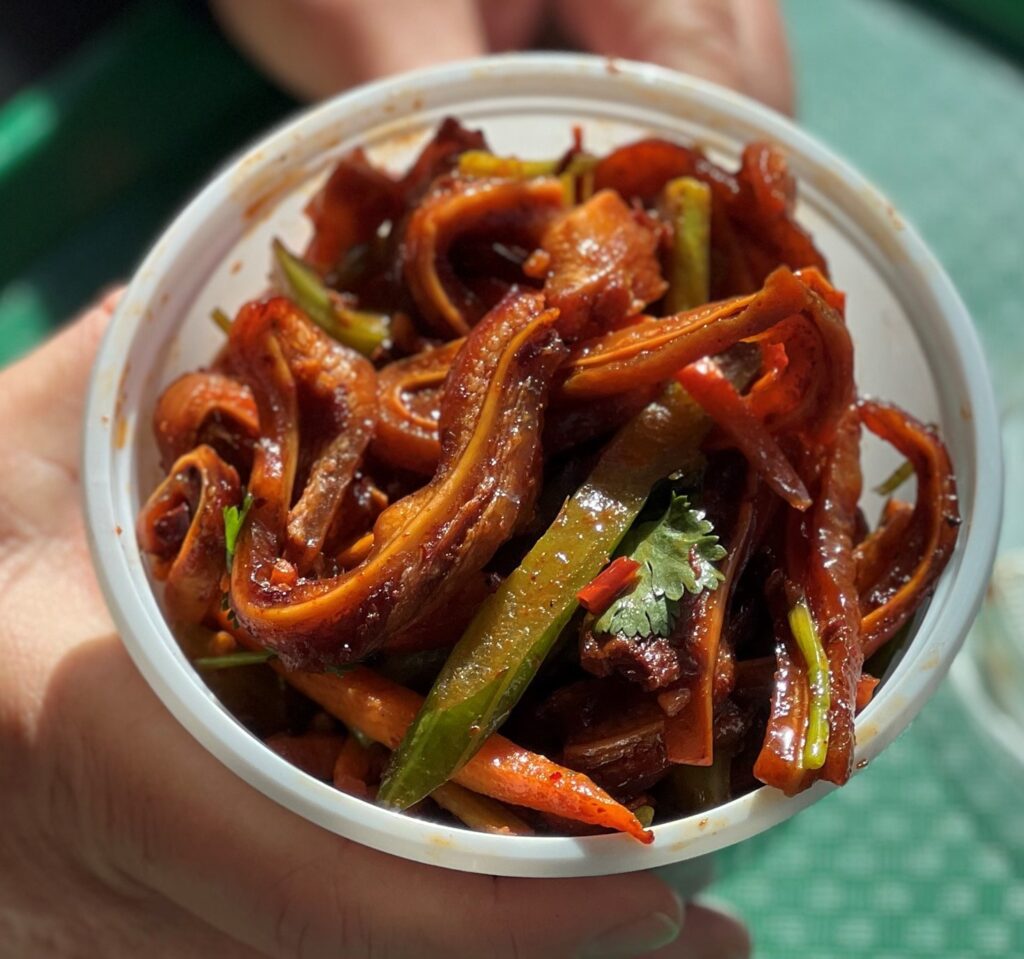
The public market is the working-class contribution to a flourishing Richmond food scene that has gained international attention for its diverse Asian chefs and out-of-this-world menus.
In the past two decades, Vancouver’s agricultural suburb across the Fraser River has been transformed into an energetic community of Hong Kong and mainland China immigrants who brought their traditional cooking to British Columbia, similar to what has happened in Los Angeles’ San Gabriel Valley.
The atmosphere resembles the streets of Chengdu or Hong Kong just an hour’s drive from Bellingham.
With a population of about 75% Asian descent, Richmond is the center of dim sum palaces, food courts offering to-die-for noodles and dumplings and expansive Chinese grocers, such as Foody World and T&T Supermarket.
No wonder Chinese immigrants call it Fu Gwai Moon (Fortune’s Gate).
I explored Richmond four times this summer to sample as much food as possible because, well, someone had to do it.
Early colonial settlers gravitated to Richmond because of the fertile soil. The township has remained a haven of cranberry and blueberry production.
With more than 180 local farms, Asian chefs have access to produce as well as freshly caught fish off the docks at Fisherman’s Wharf in the too-cute village of Steveston.
“We’re living in a white colonial town and you have this amazingly rich ethoberg with great Chinese food,” local food blogger Fernando Medrano said. “A bunch of Hong Kong restaurant groups planted their flag in Richmond” after the 1997 handover to China.
Richmond’s Asian citizenry once had to travel to Vancouver’s Chinatown to get bags of rice, Medrano recalled. Now practically everything from China can be found amid gleaming apartment buildings and state-of-the-art shopping centers.
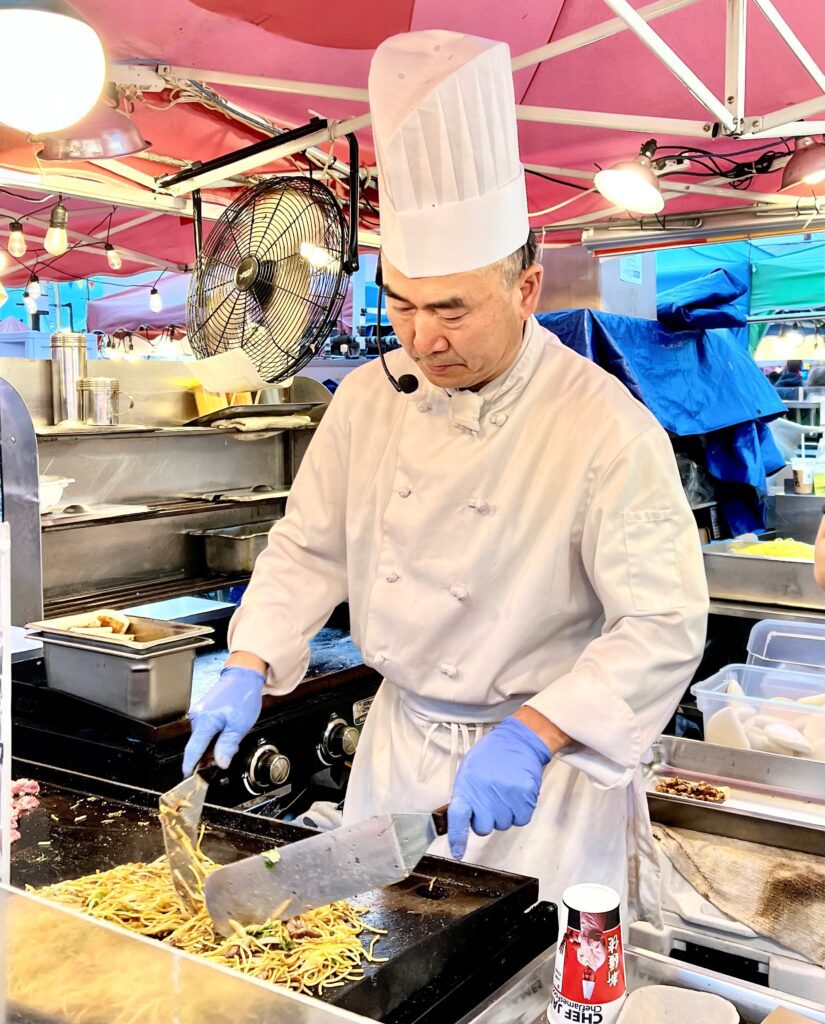
For first-time visitors, the Richmond Night Market perhaps best represents the cultural shift. It’s North America’s largest outdoor market spread across 18 acres near the Bridgeport Canada Line Station. An April to October weekend extravaganza, it features 110 food stalls filled with specialties such as sushi tacos, barbecue squid and octopus, and fried things on sticks. Chefs hawk Hong Kong-style nibbles and many traditional Chinese dishes from crammed stalls.
The food fair is intoxicating with vendors cranking up smoky grills to sizzle meats and seafood and dazzle passersby with performances of cutting, shredding and mixing as flames flare up behind the Plexiglas windows.
It takes a sound strategy to maneuver the mass of hungry people queuing at their favorite booths. Organizers have a billboard listing the top 10 most popular dishes to help patrons sort through the alluring smells that sabotage effective decision-making.
In August, popular dishes included crispy pork belly and fries, sea salt cream mango soufflé, Japanese fried chicken (karaage) and Ellie’s favorite, a pastry called Bananarama that is shaped like a beaver tail. She generously shoved the elongated fried donut with slabs of chocolate hazel spread and sliced bananas into my mouth.
Kudos to Canadian pastry chain BeaverTails. But I didn’t cross the border for Timbits or any of the 11 BeaverTails pastries.
Left to my own devices, I would skip the dessert stalls just for a whiff of Po Wah Dim Sum’s barbecue pork buns. The Hong Kong staple is delivered with fluffy dough and generous portions of succulent, sweet meat.
Medrano, a Filipino immigrant who grew up in Richmond, describes the market as “Disneyfied.” The food critic can afford a more discerning palate because he has daily access to so many great choices.
“For people used to eating Chinese food, I find it a bit lacking,” Medrano said.
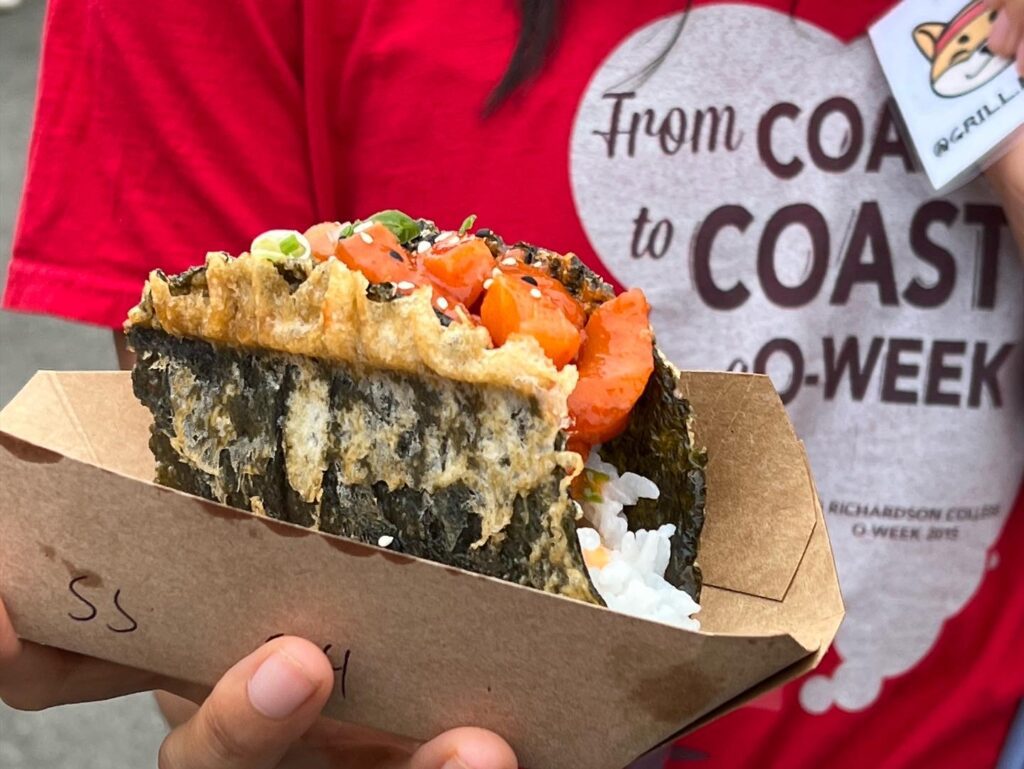
Karen Wan, the market’s senior manager, said the diverse lineup is part of the market’s growth strategy. The Night Market started with 50 booths when Raymond Cheung and Wan launched it in 2000.
It has mushroomed into 300 stalls dealing T-shirts, arts, crafts and food, and has a stage featuring a variety show of local entertainers.
While it’s still wise to bring Canadian cash, some vendors have begun accepting credit cards.
“We want to make a multiculture, international event,” Wan said. “It is like a carnival now.”
Some chefs concoct gimmicky fare to gain attention. Wan said the market is a place for young entrepreneurs to build a reputation to break into the restaurant business. In other words, it is Vancouver’s version of a Silicon Valley food incubator.
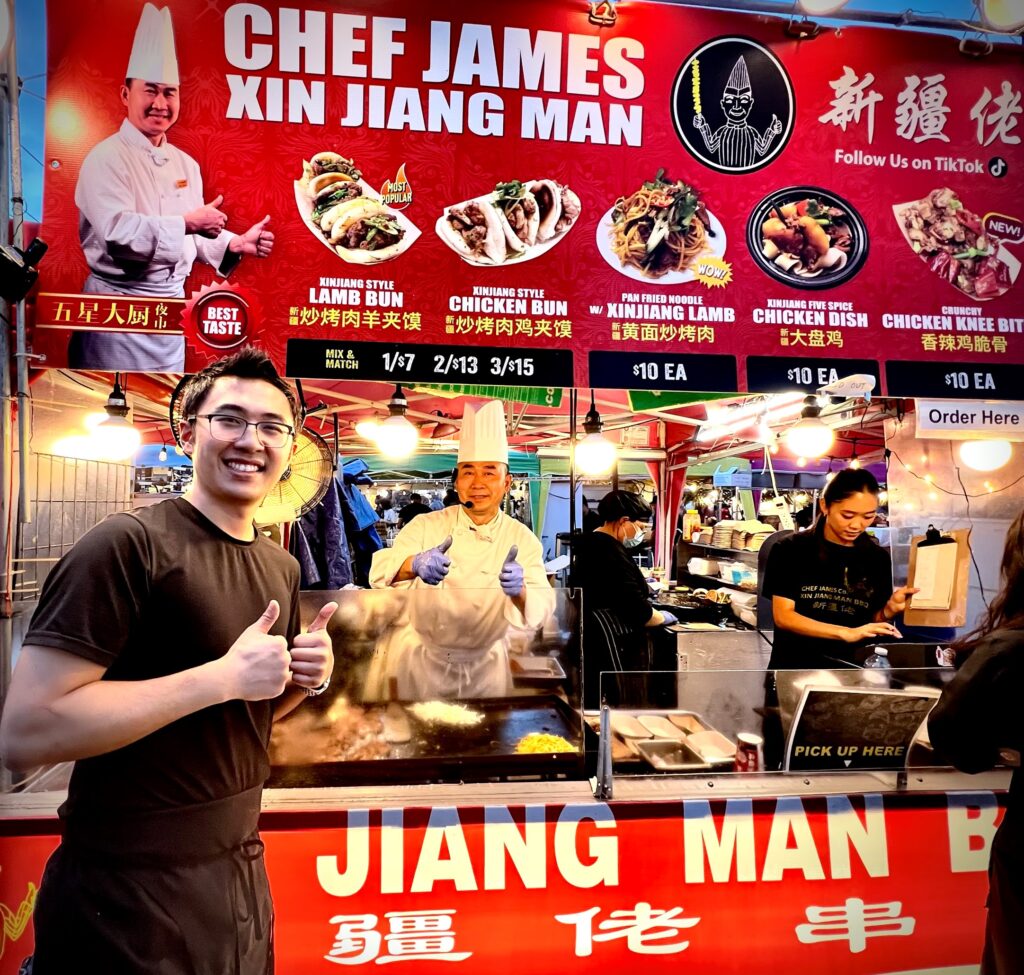
Except when it comes to Chef James Chen, the “Xin Jiang Man.” He and his family have remained at the market for 15 years instead of launching a standalone Chinese Muslim restaurant.
Cooking behind the grill in a toque blanche, Chen talks through an amplified microphone to the hungry swarm lining up to try his cooking. The chef at the high-end Fairmont Waterfront Hotel in downtown Vancouver serves Uyghur-style dishes at the market.
Chen, 58, used to cook traditional regional food such as skewers of chicken, beef and lamb kidney but changed directions this season.
“This is like Xinjiang fusion,” Kelvin Chen said as his father handed me a chewy bun brimming with chunks of seasoned lamb.
As we continued the conversation a cup piled high with noodles and lamb bits appeared.
“We turned a lot of lamb skewers and lamb barbecue over the years,” said Kelvin, who works at a Vancouver technology company when not helping his family on weekends. “This year, it’s all fusion style.”
No complaints here. The new Uyghur dishes with savory lamb laced with cumin and chili spice favored by the Chinese Muslim population have been a hit.
Kelvin and sister Lillian Chen grew up attending night markets in the autonomous region of Xinjiang in northwest China, gobbling up this Turkish-influenced cuisine.
The Chens enjoy sharing their culture through food. It highlights how Richmond’s market has brought immigrants together to relive fond memories of home.
For serious eaters, though, there is way more to Richmond than the Night Market. About half of the town’s 400 Asian restaurants reside around No. 3 Road between Westminster Highway and Cambie Road. And then there are the converted laundromats and 7-Elevens in nondescript strip malls serving uncommonly good meals.
“You just have to know where to look,” Medrano said.
Our search will continue.
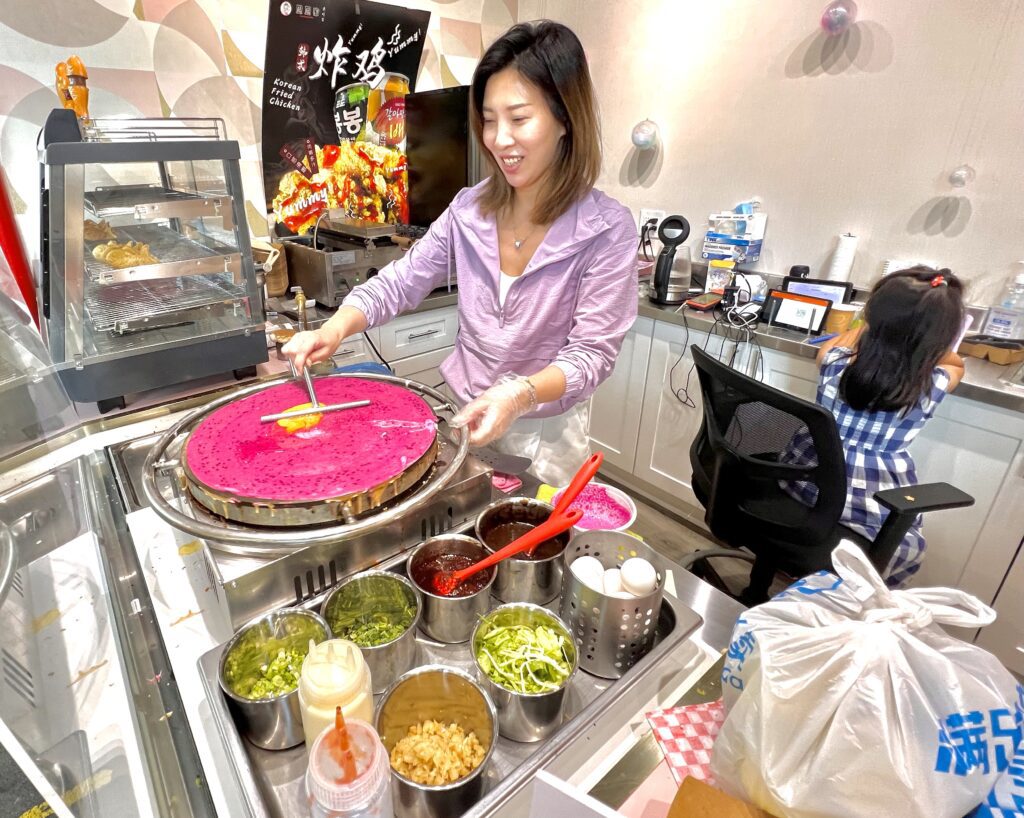
If You Go
More about the Night Market
It is located at 8351 River Road or a block from the Bridgeport Canada Line Station.
Entrance fee is US$5.30 with children under 7 and seniors 60 and older free. An Express Pass (US$26.45) is good for six people, or six separate visits, and lets holders skip the long entrance line. Parking is free.
The hours are 7 p.m. to midnight on Friday and Saturday and 7 p.m to 11 p.m. on Sunday until the season ends Oct. 10.
The Dumpling Trail
Ellie and I swear by the spicy dumplings at Chef Lu Kitchen in the Public Market. It’s not among the 16 restaurants Tourism Richmond has listed in its Dumpling Trail Guide. That means we have 16 more reasons to revisit Richmond.
The Aberdeen Centre
My first visit to Richmond came midweek when the Night Market was closed. My New Yorker friend Keiko and I left downtown Vancouver for the Aberdeen Centre, which has a third-floor food court with stomach-pleasing restaurants.
But we hoped to sneak into Fisherman’s Terrace Seafood Restaurant which seats 300 and is known for its long lines. It’s one of Richmond’s renowned dim sum palaces, where waiters bring the orders freshly made.
We arrived after the lunch crunch and got seated quickly. We ordered steamed spareribs with pumpkin and black bean sauce, a Chinese donut and pork wrapped in rice noodles and chives, Taiwanese fried chicken, and barbecue pork buns.
We floated out of the restaurant in a trance as if having a religious experience.
Steveston
The historical Japanese fishing village has enough going on to make it a standalone visit.
Fishers sell fresh catches from their boats but Steveston also offers the usual wharf fare of fish and chips, burgers and ice cream.
Stop in to meet colorful Nick Constantin, the owner of Romania Country Bread at 3680 Moncton St. He sells only one type of rustic loaf that is flavorful and filling but ridiculously overpriced at US$15. The storefront doubled as Storybrooke’s bakery in the ABC series “Once Upon a Time.”

